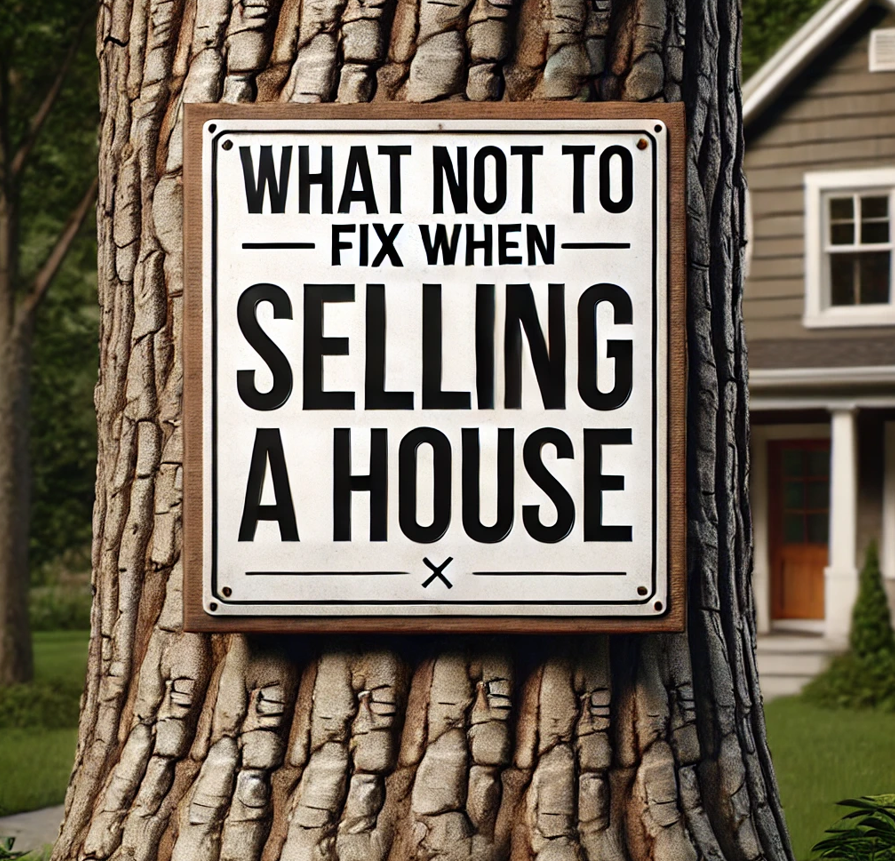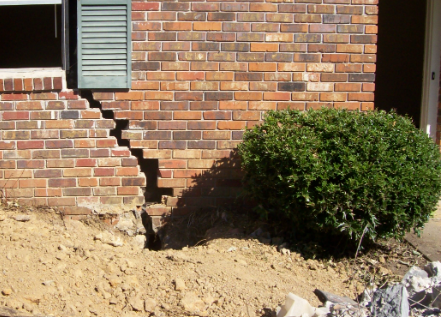*Updated January 6, 2025

What Needs To Be Repaired When Selling a Home: A Comprehensive Guide
Selling your home often involves making tough decisions about which repairs are truly necessary. While some renovations can boost your home’s appeal and selling price, others might not yield a significant return on investment. Knowing what not to fix when selling a house the traditional way or without a realtor and can save you time, money, and effort while still improving your home’s curb appeal and attracting the right buyers.
This guide will help you avoid unnecessary home repairs, prioritize minor fixes, and address safety hazards, ensuring a smoother and more efficient home selling process.

The Importance of Prioritizing Repairs
As a home seller, it’s important to know where to invest your time and money when preparing your house as-is for sale. Not all home repairs will increase the value of your home or appeal to potential buyers. Some may even delay the selling process or decrease your profit. By focusing on necessary repairs and understanding which ones are not worth fixing, you can achieve the best return on your investment by simply focusing on getting the property in good working order.
- Maximize Profit: Avoid unnecessary expenses on repairs that won’t increase your home’s selling price.
- Time Efficiency: Focus on fixes that will have a significant impact without prolonging the selling process.
- Buyer Appeal: Understand what potential buyers are looking for in your local market.
According to the National Association of Realtors, making strategic decisions about home repairs can significantly affect your home’s market value and the speed of sale.
Factors to Consider Before Making Fixes
Before diving into home repairs, consider these factors:
- Home’s Condition: Evaluate your home’s current condition to identify major repairs versus minor problems.
- Local Market: Understand the housing market in your area and what buyers are expecting in terms of home features and condition.
- Cost vs. Value: Determine if the cost of a repair will significantly increase the value of your home or the asking price.
- Buyer Expectations: Consider what prospective buyers expect in terms of home condition and features.
- Time Constraints: If you need to sell quickly, focus on the easiest ways to enhance appeal without major renovations.
An experienced real estate professional or local real estate agent with years of experience can provide valuable insights into what a traditional or cash buyer in your area is looking for.
Cosmetic Issues You Can Overlook
Minor Wear and Tear
Every home experiences normal wear and tear over time. Minor problems like small scratches on walls, nail holes, or tiny dings in baseboards are generally acceptable to buyers. Investing in repairs for cosmetic flaws may not yield a significant impact on your home sale price.
Neutral Paint Choices
While a fresh paint job can brighten up a space, repainting every room isn’t necessary if your walls are already painted in neutral colors and are in good condition. Buyers might prefer to personalize the space with their own paint colors after moving in.
Window Treatments
Outdated or personalized window treatments can be left as they are. Unless they are damaged, there’s no need to replace them. Buyers often replace window treatments to suit their personal taste.

Outdated Appliances and Fixtures
Old Appliances
Replacing old appliances like the water heater, air conditioning unit, or laundry room machines can be costly. If they are still functioning properly, you can leave them as is. Many buyers understand that appliances have a lifespan and may plan to replace them with new appliances that suit their preferences after purchasing the home.
Light Fixtures
Updating light fixtures can modernize a space, but it’s not always necessary. Unless a fixture is broken or significantly outdated, you can leave existing fixtures in place. Buyers may want to choose their own fixtures to match their style.
Minor Electrical and Plumbing Issues
Minor Electrical Issues
Small issues like a faulty light switch or an outdated electrical service panel that still meets code requirements can be left alone. These minor electrical issues are often not deal-breakers for buyers and may be addressed during the home inspection phase. However, an HVAC repair is worthwhile. That’s why a study at Texas A&M found homes with minor HVAC tweaks sold 15% faster – a happy hum beats a high-tech headache any day!
Plumbing Issues
Unless you’re experiencing major leaks or water damage, minor plumbing issues like a slow-draining sink can be overlooked. Buyers may negotiate these minor repairs after the inspection, and fixing them upfront may not significantly increase your home’s value.
Major Renovations to Avoid Negative ROI
Kitchen Remodels
A full kitchen remodel can be extremely expensive and may not offer the best return on investment. Instead of investing in a major renovation, focus on small updates like adding a fresh coat of paint or replacing outdated hardware on kitchen cabinets.
Bathroom Overhauls
Like the kitchen, a complete bathroom remodel might not be worth the cost. Unless the bathroom is in extremely poor condition, you can skip major renovations and focus on cleanliness and minor repairs.
New Windows
Installing new windows can improve energy efficiency but comes with a high price tag. If your existing windows are in good condition, it’s not necessary to replace them before selling.
Foundation Problems
Addressing minor cracks is important, but major foundation repairs can be costly and time-consuming. Unless the issues are severe and affect the structural integrity of the home, you might consider adjusting your asking price instead of undergoing major repairs.

Personalized Renovations to Skip
Smart Home Technology
Installing smart home technology might seem like a good idea, but not all buyers value these features. It’s best to avoid investing in personalized renovations that may not appeal to everyone.
Unique Landscaping
While curb appeal is important, extensive or unique landscaping projects may not add value. Simple lawn maintenance and adding some flowers can enhance appeal without overdoing it.
Custom Garage Door
A new, customized garage door can be expensive. Unless the existing one is damaged, it’s not worth fixing or replacing solely for the sale.
Flooring and Carpeting Choices
Flooring Preferences
Floor coverings are highly personal choices. Replacing carpet with hardwood floors or vice versa can be costly and may not appeal to all home buyers. Unless the flooring is damaged, you can leave it as is.
Minor Flooring Repairs
Fixing minor cracks or scratches in flooring can be time-consuming and may not significantly impact the sale. Focus on cleaning and presenting the flooring in its best condition.

When to Invest in Home Renovation and Repairs
While many repairs can be skipped, some are worth the investment:
Addressing Safety Hazards
Fix any code violations or safety issues, such as faulty wiring, structural problems, or significant electrical problems. These major repairs are crucial and can be deal-breakers if left unaddressed. A home inspector will likely identify these issues in the home inspection report, and they can significantly affect the selling price.
Enhancing Curb Appeal
First impressions matter. Investing in exterior paint, fixing walkway cracks, or adding fresh landscaping can increase your home’s appeal without major renovations.
Fresh Paint
Applying a fresh coat of neutral paint in rooms with bold or outdated colors can make the home more appealing. This is one of the easiest ways to improve a space without spending much money.
Repairing Major Damage
If there’s significant damage to essential systems like the roof, foundation, or HVAC system, it’s a good idea to address these issues. These are often considered major repairs that can affect the value of your home and the buyer’s willingness to make an offer.
Consulting with Real Estate Professionals
Working with an Experienced Real Estate Professional
An experienced real estate professional or local agent can provide valuable insights into what repairs are worth making. They understand the local housing market conditions and can help you prioritize your do-not-fix list to maximize the value of your home.
Understanding the Market Value
Your agent can provide a Remodeling Impact Report or comparable market analysis (CMA) to show which home improvements offer the best return in your area. This information can guide your decisions on where to invest.
Navigating Building Code Issues
If your home has grandfathered-in building code issues or an outdated electrical service panel that still functions safely, your agent can advise whether these need to be addressed or can be left for the new owner.
Creating Mass Luxury Appeal
In our experience with over 2800 real estate transactions completed, we have one overriding design and renovation philosophy to balance out the needs for high ROI but also offering a quality housing product that fly off the shelf. Simply put, we call it “mass luxury”. The primary idea is to spend money to project a luxury product but also affordable to the mass market.
It becomes a number game and where to set your aim to appeal and attract the widest audience and potential home buyers as possible. Internally, this mass luxury appeal is best described as we want to be like Target of shopping stores, but for the housing market. Target’s success derives from this mass luxury aesthetic. It appeals to the consumer as being a store with luxury product but at affordable prices. We don’t want to be Louis Vuitton or Tiffany, nor do we want to be Dollar Tree or Walmart on the lower end. We want that mass market appeal that Target has so successfully accomplished in their market niche.
See our You tube channel where we dive deeper into the numbers game of the single family housing market and how we accomplish “mass luxury appeal” for home buyers.
Enhancing Your Home’s Appeal Profitably
As a home seller, your goal is to present your home in the best light without unnecessary expenses. By focusing on necessary repairs, addressing minor problems, and understanding what not to fix when selling a house in Texas, you can attract potential buyers and achieve the best return on your investment.
- Declutter and Clean: A clean, clutter-free home is more appealing to buyers.
- Simple Landscaping: Enhance curb appeal with minimal effort and cost.
- Fix Minor Issues: Address minor repairs that could deter buyers, like leaky faucets or loose doorknobs.
- Highlight Energy Efficiency: If your home has energy-efficient features, make sure to highlight them in listings.
- Personal Taste Consideration: Allow room for buyers to envision their personal taste in the home without over-customizing.
Remember that every home and market is different. What works for one seller may not work for another. Consult with professionals, assess your home’s condition, and make informed decisions to ensure a successful sale.
** Need to sell your house as-is quickly without the hassle of extensive home repairs? Consider reaching out to a reputable real estate investor for a cash offer like Bright Bid Homes. This can simplify the home selling process, save you time, and eliminate the stress of making costly repairs.

** Disclaimer: This article is for informational purposes only and does not constitute professional advice. Every home and market is unique, and the information provided may not apply to your specific circumstances. We recommend consulting with a licensed real estate professional to determine the best course of action for your property.

